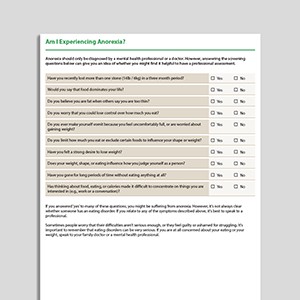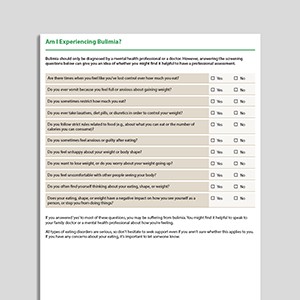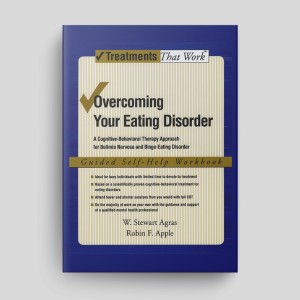Eating Disorders
People with eating disorders experience significant alterations in their relationships with food. For example, individuals with anorexia nervosa restrict their food intake and individuals with bulimia nervosa experience episodes of binge eating followed by efforts to avoid gaining weight, including vomiting or excessive exercise. Cognitive behavioral therapy (CBT) and family-based therapy (FBT) are both evidence-based treatments for eating disorders.
Effective Weight Loss: An Acceptance-Based Behavioral Approach: Workbook
Effective Weight Loss: An Acceptance-Based Behavioral Approach: Workbook
Effective Weight Loss: An Acceptance-Based Behavioral Approach: Clinician Guide
Effective Weight Loss: An Acceptance-Based Behavioral Approach: Clinician Guide
Scaling - Testing Your Assumptions
Scaling - Testing Your Assumptions
Insufficient Self-Control
Insufficient Self-Control
Cognitive Distortions – Unhelpful Thinking Styles (Common)
Cognitive Distortions – Unhelpful Thinking Styles (Common)
Cognitive Distortions – Unhelpful Thinking Styles (Extended)
Cognitive Distortions – Unhelpful Thinking Styles (Extended)
Permissive Thinking – Self-Monitoring Record
Permissive Thinking – Self-Monitoring Record
Identifying Your Demanding Standards
Identifying Your Demanding Standards
Exploring Your Demanding Standards
Exploring Your Demanding Standards
Evaluating Your Demanding Standards
Evaluating Your Demanding Standards
Recognizing Bulimia Nervosa
Recognizing Bulimia Nervosa
Recognizing Anorexia Nervosa
Recognizing Anorexia Nervosa
Recognizing Binge Eating Disorder
Recognizing Binge Eating Disorder
Overcoming Eating Disorders (Second Edition): Therapist Guide
Overcoming Eating Disorders (Second Edition): Therapist Guide
Overcoming Your Eating Disorder: Workbook
Overcoming Your Eating Disorder: Workbook
Eating And Your Energy Levels
Eating And Your Energy Levels
Starvation Syndrome – The Effects of Semi-Starvation
Starvation Syndrome – The Effects of Semi-Starvation
Discounting In Perfectionism – The Ratchet Effect
Discounting In Perfectionism – The Ratchet Effect
Demanding Standards – Living Well With Your Personal Rules
Demanding Standards – Living Well With Your Personal Rules
What Keeps Bulimia Going?
What Keeps Bulimia Going?
Uncertainty Beliefs – Experiment Record
Uncertainty Beliefs – Experiment Record
What Keeps Anorexia Going?
What Keeps Anorexia Going?
Cognitive Behavioral Model of Perfectionism (Shafran, Egan, Wade, 2010)
Cognitive Behavioral Model of Perfectionism (Shafran, Egan, Wade, 2010)
Links to external resources
Psychology Tools makes every effort to check external links and review their content. However, we are not responsible for the quality or content of external links and cannot guarantee that these links will work all of the time.
Assessment
-
Eating Attitudes Test 26 (EAT-26)
| Garner, Olmsted, Bohr, Garfinkel | 1982
- Test (PDF)
- Test (Word)
- Scoring and interpretation
- Website link
- Reference Garner et al. (1982). The Eating Attitudes Test: Psychometric features and clinical correlates. Psychological Medicine, 12, 871-878
-
Eating Disorder Examination (EDE)
| Fairburn, Cooper, O’Connor | 2014
- Interview
- Questionnaire (EDE-Q)
- Questionnaire for Adolescents (EDE-A)
- Reference Fairburn, C. G., Cooper, Z., & O’Connor, M. (1993). The eating disorder examination. International Journal of Eating Disorders, 6, 1-8.
-
ED15
| Tatham, Turner, Mountford, Tritt, Dyas, Waller | 2015
- Scale
- Reference Tatham, M., Turner, H., Mountford, V. A., Tritt, A., Dyas, R., & Waller, G. (2015). Development, psychometric properties and preliminary clinical validation of a brief, session‐by‐session measure of eating disorder cognitions and behaviors: The ED‐15. International Journal of Eating Disorders, 48(7), 1005-1015.
-
Assessment Of Eating Disorders: Review And Recommendations For Clinical Use
| Anderson, Lundgren, Shapiro, Paulosky | 2004
- Journal article
Exercises
- Binge Analysis | CREDO
Guides and workbooks
- Cognitive Behavioral Therapy for Avoidant/Restrictive Food Intake Disorder (CBT-AR): patient and family workbook | Thomas, J.J, Eddy, K.T | 2019
- Self-help manual for bulimia nervosa | Freeman, Downey | 2001
- Taming the hungry bear: Your way to recover from chaotic overeating | Kate Williams
Information Handouts
- Helpful tips after residential treatment
-
Disordered Eating: Key Psychoeducation (Information Handouts)
| Centre For Clinical Interventions
- What Are Eating Disorders?
- What Is Binge Eating?
- What Is Starvation Syndrome?
- Set Point Theory
- Eating Disorders and Neurobiology
- Eating Disorders: What Are The Risks?
- Eating Disorders in Men
- Atypical Anorexia Nervosa
- Binge Eating Disorder
-
Disordered Eating: Treatment (Information Handouts)
| Centre For Clinical Interventions
- Orientation To Treatment
- Family Based Therapy: Information for Carers, Consumers, and Professionals
- A Guide to Self-Monitoring
- Weekly Weighing
- What Are Safety Behaviours?
- Eating Disorders Information For Carers
-
Disordered Eating: Information About Eating (Information Handouts)
| Centre For Clinical Interventions
- Normal Eating vs. Disordered Eating
- Why Diets Do Not Work
- Regular Eating for Recovery
- Dietary Guidelines During Recovery
- Evaluating Dietary Advice
- Metabolism and Energy Requirements
- The REAL food pyramid
- Making Sense of Serving Sizes
- Carbohydrates – Myths and Facts
- Counting Calories
- Clean Eating
- All About Iron
- The Facts on Fat
- Vegetarian Diet and Eating Disorders
-
Disordered Eating: Your Physical Health (Information Handouts)
| Centre For Clinical Interventions
- Unhealthy Exercise
- Vomiting and Your Health
- Laxative Misuse
- Gastrointestinal Changes
- Calcium and Bone Health
- Eating Disorders and Hormones
- Eating Disorders and Pregnancy
-
Disordered Eating: Body Image (Information Handouts)
| Centre For Clinical Intervention
- Body Checking and Avoidance
- Body Image and Body Satisfaction
- Media and Body Image
- Unhelpful Thinking Styles
- Transdiagnostic CBT-E formulation | CREDO
- Instructions for self monitoring (eating disorders) | CREDO
- Regular eating (patient handout) | CREDO
- Anorexia nervosa
- Binge eating disorder n
- Bulimia nervosa
- Compulsive exercise
Information (Professional)
- Topics to cover when assessing the eating problem | Fairburn | 2008
- Topics to cover when educating patients about eating disorders | CREDO
- Short-term maintenance plan (Eating disorders) | CREDO
- Long-term maintenance plan (Eating disorders) | CREDO
Presentations
- Evidence-based cognitive behavioural therapy for eating disorders: principles and practice | Glenn Waller | 2017
- Putting the ‘B’ back into CBT for eating disorders | Glen Waller | 2011
- Transdiagnostic CBT for eating disorders “CBT-E” | Chris Fairburn | 2016
Self-Help Programmes
-
Break Free From ED (Workbook)
| Centre For Clinical Interventions | 2022
- Module 1: What Are Eating Disorders?
- Module 2: What Keeps Eating Disorders Going?
- Module 3: Understanding The Number On The Scale
- Module 4: Self-Monitoring
- Module 5: Food And Energy
- Module 6: Eating For Recovery - Part 1
- Module 6: Eating For Recovery - Part 2
- Module 8: Binge Eating
- Module 9: Purging
- Module 10: Driven Exercise
- Module 11: Body Image 1 - Body Checking
- Module 12: Body Image 2 - Body Avoidance
- Module 13: Core Beliefs
- Module 14: Maintaining Your Gains And Dealing With Setbacks
- Appendix: Getting Educated About Eating Disorders
Treatment Guide
- Eating Disorders: Recognition And Treatment (NICE Guideline) | NICE | 2020
- Maudsley Service Manual For Child And Adolescent Eating Disorders | Eisler, Simic, Blessitt, Dodge | 2016
- Eating disorders: recognition and treatment | National Institute for Health and Care Excellence (NICE) | 2020
- Group cognitive remediation therapy for adolescents with anorexia nervosa: The flexible thinking group | Maiden, Baker, Espie, Simic, Tchanturia | 2014
Video
- Eating disorders from the inside out | Dr Laura Hill | 2012
Worksheets
-
Disordered Eating (Worksheets)
| Centre For Clinical Interventions
- Change Process Balance Sheet
- Tackling Avoided Foods
- Self-Monitoring Form
- Blank Monitoring Record | CREDO
Recommended Reading
- Cooper, Z., Fairburn, C. (2009). Management of bulimia nervosa and other binge-eating problems. Advances in Psychiatric Treatment, 15, 129-136
- Cooper, Z., & Fairburn, C. G. (2011). The evolution of “enhanced” cognitive behavior therapy for eating disorders: Learning from treatment nonresponse. Cognitive and behavioral practice, 18(3), 394-402
- Murphy, R., Straebler, S., Cooper, Z., & Fairburn, C. G. (2010). Cognitive behavioral therapy for eating disorders. Psychiatric Clinics of North America, 33(3), 611-627
- Pallister, E., & Waller, G. (2008). Anxiety in the eating disorders: Understanding the overlap. Clinical psychology review, 28(3), 366-386.
- Wade, T. D., Shafran, R., Cooper, Z. (2023). Developing a protocol to address co-occurring mental health conditions in the treatment of eating disorders. International Journal of Eating Disorders
- Waller, G. (2016). Recent advances in psychological therapies for eating disorders. F1000Research, 5.
What Are Eating Disorders?
Signs and Symptoms of Eating Disorders
Common to many of the eating disorders are a preoccupation with weight and body shape, significant anxiety about gaining weight, and behaviors intended to mitigate the anxiety.Symptoms of anorexia nervosa may include:restriction of energy intake leading to weight that is less than minimally normal or expected in the context of age, sex, developmental trajectory, and physical health;
an intense fear of gaining weight, an intrusive dread of fatness, or persistent behavior that interferes with weight gain;
disturbed perception of one’s body weight (e.g., a self-perception of being too fat);
self-evaluation is unduly influenced by body weight or shape;
a persistent lack of insight regarding the seriousness of low body weight;
endocrine disorder resulting in amenorrhea or loss of sexual interest or potency.
recurrent episodes of binge eating (overeating) where excessively large amounts of food are consumed in a discrete period of time;
a feeling of lack of self-control over eating during a binge-eating episode;
recurrent behaviors to counteract weight gain such as self-induced vomiting, purging, fasting, use of drugs, diuretics, or excessive exercise;
self-evaluation is unduly influenced by body weight or shape;
a self-perception of being too fat and an intrusive dread of fatness.
Psychological Models and Theory of Eating Disorders
Fairburn, Cooper, and Shafran (2003) proposed a transdiagnostic cognitive behavioral model of eating disorders that describes the maintenance of both anorexia nervosa and bulimia nervosa. Central to the model is the individual’s judgment of their self-worth in terms of body weight or shape. Disordered eating behaviors are understood as a consequence of these self-beliefs.Evidence-Based Psychological Approaches for Working with Eating Disorders
Enhanced Cognitive Behavior Therapy for Eating Disorder (CBT-E)
In 2003, Fairburn et al. argued for value in viewing eating disorders from a transdiagnostic perspective. They say that common mechanisms, such as a restricted assessment of self-worth, underpinned both anorexia and bulimia. CBT-E includes elements that focus on modification of eating habits, weight-control behavior, and concerns about eating, shape, and weight.Family-Based Treatment (FBT) / Maudsley Family Therapy
FBT is an outpatient, intensive treatment in which the family is used as the primary resource to renourish the affected child or adolescent. It is described as a highly practical approach that attempts to modify problems in family structure that make refeeding more difficult (Lock and le Grange, 2005). Average length of treatment is 9–12 months. A 2013 meta-analysis indicated that individual therapy and FBT were equivalently effective at the end of treatment, but that FBT was superior at 6–12 month follow-up (Couturier, Kimber, & Szatmari, 2013).Resources for Working with Eating Disorders
Psychology Tools resources available for working therapeutically with eating disorders may include:psychological models of eating disorders including anorexia and bulimia
information handouts for eating disorders including anorexia and bulimia
exercises for eating disorders including anorexia and bulimia
CBT worksheets for eating disorders including anorexia and bulimia
self-help programs for eating disorders including anorexia and bulimia
References
Couturier, J., Kimber, M., & Szatmari, P. (2013). Efficacy of family‐based treatment for adolescents with eating disorders: A systematic review and meta‐analysis. International Journal of Eating Disorders, 46(1), 3–11.
Fairburn, C. G., Cooper, Z., & Shafran, R. (2003). Cognitive behaviourtherapy for eating disorders: A ‘transdiagnostic’ theory and treatment. BehaviourResearch and Therapy, 41(5), 509–528.
Lock, J., & le Grange, D. (2005). Family‐based treatment of eating disorders. International Journal of Eating Disorders, 37(S1), S64–S67.

















































